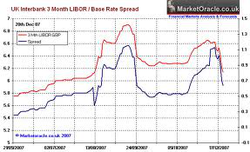On July 6, 2012, regulators, including English, German, Japanese, and North American open investigations about the Libor against banks.
htpp://www.thejournalofregulation.com/spip.php?artice1531

On June 27, 2012, the "Financial Securities Authority – FSA" of the United Kingdom sanctioned the Barclays Bank to have manipulated the Libor. By a chain reaction, on July 6, 2012, the German regulator, Bafin, opened an investigation into banks, with no doubt on Deutsche Bank, while the Japanese regulator, the "Securities Exchange Commission" in the United States, the Canadian competition office, in particular open all investigations since the 6 July concerning all banks within their competence on their statements. In addition, JP Morgan said that it was already the subject of a class action in this regard. The domino effect begins.
© thejournalofregulation
On June 27, 2012, the "Financial Securities Authority – FSA" had sanctioned the Barclays to have manipulated the Libor. We could fear that in revealing that, in a declarative system where each Bank announces at what rate it is ready to acquire securities, which produces a ratio on which is based all of the transaction, the manipulations are child’s play, by the fact of mere false statement, the suspicion comes as banks may lie...
Once the suspicion comes to the regulator that banks, critical agents of financial markets, as we can see here, can lie while they bear two interest not necessarily converging in the short term (the one of the market by the rate of transactions that backing in the Libor and their by the transactions they want themselves operate), regulators can only open investigations in series.
Indeed, the structural conflict of interest is not problematic if one admits that the banks are virtuous (self-regulation), or preferred their long term interest (credibility, stability of the financial market that they bear themselves, which makes them all the more essential). If we cease to accept one of the two branches of this alternative that justifies the self-sufficiency of the declarative system, hunting is open.
Thus:
• The 6 July 2012, the Bundesanstalt für Finanzdienstleisturngsaufsicht - Bafin opened an international inquiry on possible manipulations of Libor by German banks. The press said that the Deusche Bank would be concerned in the first place. The findings of the investigation are expected for mid-July. The action of the Deusche Bank plunged on the stock market.
• In United Kingdom, after the sanction imposed by the regulator to the Barclays, the Serious Fraud Office (SFO) launched the July 6, 2012 a criminal investigation on the manipulations of the Libor, without specifying what banks were covered. This is legally based, because the investigations are in in rem and not in personam. It is possible that banks such as Royal Bank of Scotland (RBS) and the Société Générale are concerned by the criminal investigation. In addition, the British Parliament has decided to open a parliamentary inquiry on banks
•In the USA, the Securities Exchange Commission, the Department of Justice (DoJ), the Commodity Futures Trading Commission (CFTC), requested information banks Citigroup and JP Morgan
•In Japan, the Japan Financial Services Authority (JPSA) requested information on the same subject to these two banks.
•In Canada, because this rate related to interbank relations, it is the Competition Bureau that made the requests for information. Here we find the difficult border or the overlapping of jurisdiction between right of competition and of regulation (competition authorities frequently sanctioned banks about interbank commissions, for example, and obtained through commitments, cuts, equivalent to an act of ex ante regulation).

your comment